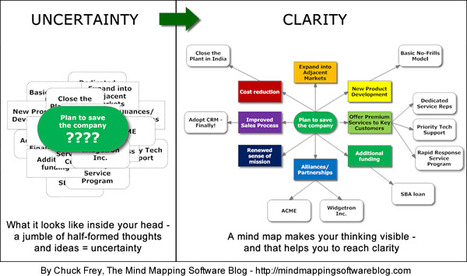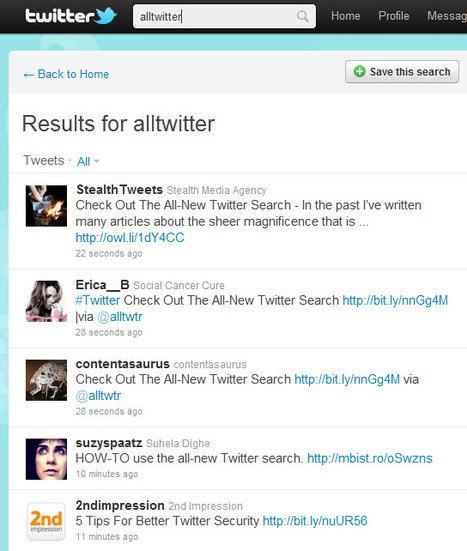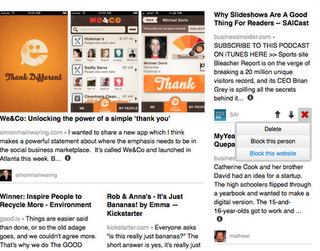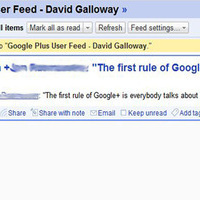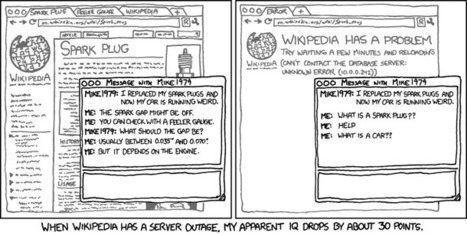 Your new post is loading...
 Your new post is loading...

|
Scooped by
Howard Rheingold
August 19, 2011 2:11 PM
|
(If you or your company are interested, I can put you on a notification mailing list for this workshop) A half-day (four hour) online workshop with Howard Rheingold introduces the mindset, attention training, online media skills, and information tools you need to transform information overload into knowledge navigation. Learn about tools to bring continuous streams of relevant information to your attention and techniques for harvesting useful knowledge and avoiding distraction.

|
Scooped by
Howard Rheingold
August 16, 2011 1:32 PM
|
John Barrett, the director of research for market research firm Parks Associated, which specializes in consumer technology trends, believes young consumers approach these platforms differently than adults by focusing on what they care about. "Some kids receive up to 300 texts a day, but they aren’t responding to all of them," Barrett said. "They don't feel the need to do so. They are selecting which messages seem to be the highest priorities and then they respond. It feels like less of a task for them." Barrett likens the method to the Caller ID feature on a phone.

|
Scooped by
Howard Rheingold
August 15, 2011 11:43 AM
|
The concept is simple. High-performance groups effectively manage their information. People know what they need to know to do their jobs, they know where information is when they need to find it, and they’re always ready to manage and adapt to new information.

|
Scooped by
Howard Rheingold
August 11, 2011 3:51 PM
|
Faced with complex problems, our brains have trouble coping. We can’t see the entire scope of the problem clearly. We can’t envision how to solve it. Our brains are a jumble of half-formed thoughts and ideas. In the words of time management expert David Allen, our “psychic RAM” is full. And that leads to uncertainty and inaction. Now imagine taking that same challenge and putting all of your thoughts and ideas on screen, using mind mapping software.

|
Scooped by
Howard Rheingold
August 7, 2011 2:42 PM
|
With so much information produced daily, foundation professionals are facing information overload. Search engines can deliver more than a million results, but they are not always authoritative or relevant. So how can you search smarter and not harder? Below are four tools and tips that can help you save time and money.

|
Scooped by
Howard Rheingold
July 27, 2011 12:25 PM
|
Generate RSS feeds for Twitter searches

|
Scooped by
Howard Rheingold
July 26, 2011 5:34 PM
|
What many of those same people don’t know is that Twitter’s search functionality is really, really clever. How smart? Well, for starters, it can easily track any web page that has been shared on Twitter… even if it’s hidden inside another URL.
That’s right – Twitter search is smart enough to look inside a shortened URL for the information you require. As far as I can tell it doesn’t seem to matter which URL shortener is used to make the link (bit.ly, bit.ly Pro, ow.ly, and so on) – Twitter is savvy enough to figure it out.
You can enter the full URL for very specific, targeted results, or you can use a partial to cast a wider net.

|
Scooped by
Howard Rheingold
July 25, 2011 5:21 PM
|
Generates an RSS feed from any Twitter list, e.g. http://twitter.com/twitterapi/team (for some reason Twitter doesn't support RSS feeds for lists, although lists are in the API).

|
Scooped by
Howard Rheingold
July 22, 2011 3:52 PM
|
If that weren’t enough to prove the movement fighting the data deluge is gaining steam, there’s now a nonprofit devoted to tackling the problem: The Information Overload Research Group launched in February to “conquer information overload” and “restore sanity” to working professionals. A new buzz word has been coined: Blue State Digital founder Clay Johnson has a site called “Infovegan”—“a blog about information obesity, information diets, and civic accountability.”

|
Scooped by
Howard Rheingold
July 21, 2011 6:02 PM
|
Are you subscribed to enough people on Twitter, Facebook, feeds and other inbound information that you're pretty sure you miss a lot of good things? New York startup KnowAbout.It launches out of private beta today and is now freely available to anyone who would like to tackle that problem. The service brings in all your subscribed content from major social networks, then offers a number of different ways to sort what it finds. My favorite is the filter called "Potentially Missed - links from people who don't share a lot of links." All of the different sorting options make up a smart system based mostly on thoughtful permutations of publicly available, structured fields of data.

|
Scooped by
Howard Rheingold
July 20, 2011 5:54 PM
|
I don’t think it’s a sign that technology is rotting our cortex – I think it shows that we’re wise enough to outsource a skill we’re not very good at. Because while the web enables all sorts of other biases – it lets us filter news, for instance, to confirm what we already believe – the use of the web as a vessel of transactive memory is mostly virtuous. We save hard drive space for what matters, while at the same time improving the accuracy of recall.

|
Scooped by
Howard Rheingold
July 15, 2011 12:58 PM
|
How do you find and isolate all the good stuff, separate the wheat from the chaff, and use the information you’re receiving to actually move the needle? The same way that you get the good stuff out of crude oil, weak brews, and perfume herbs: distillation.

|
Scooped by
Howard Rheingold
July 12, 2011 12:54 PM
|
lying (successfully) is a form of extreme multitasking, particularly when flying on instruments in the weather or at extremely low levels at night (something I specialized in). Pilots organize their multitasking by scanning the information sources (the radio, altimeter, outside, intercom, airspeed, attitude indicator, etc.) in a very organized manner and modifying that scan depending on the type of flying being done.
|

|
Scooped by
Howard Rheingold
August 17, 2011 12:50 PM
|
Taming the surge of information can be one of the trickiest things about using services like Twitter. Useful, actionable information appears in a river of news, and it gets swept away almost as soon as you see it. Post Post is a new Twitter “strip search” that scrapes away all the clutter, and helps you discover and track content from those people to whom you’re already strongly connected. To do this, Post Post determines the 200 most relevant people in your Twitter network and allows you to track their comments, links, videos and other content.

|
Scooped by
Howard Rheingold
August 16, 2011 1:30 PM
|
Think of all the information that comes your way every day via your smart phones your computers manuals, menus and even relatively old-fashioned books, newspapers and magazines. Is it sometimes too much to absorb? What if you could read it faster?

|
Scooped by
Howard Rheingold
August 12, 2011 12:29 PM
|
Generate RSS feeds for any web site for free.

|
Scooped by
Howard Rheingold
August 7, 2011 2:43 PM
|
I might be considered more of a “power user” than some when it comes to social media. There’s many of you who can’t or won’t even fathom having that much information flowing at you all the time. It’s too stressful. I agree, it can be stressful when you think about all of that information at once. But the truth is, there’s a way to manage the information tidal wave that social media can create. Here’s how I do it. Filter extensively.
The only way I really survive being bombarded by information is by filtering. The first thing I do is, I never worry about what I might miss because I’m filtering.

|
Scooped by
Howard Rheingold
July 27, 2011 1:27 PM
|
The Augmented Mind is the active personal and collective cognitive environment that electronic technologies have weaved in and around us via the Internet in particular and electricity in general.
It functions both as an extended memory and a processing intelligence for each one of the users of electronic technologies from the telegraph to “cloud computing” and Twitter. It brings people together instead of separating them as the alphabet did and it allows for any number of individual entries in a fluid information space definable for individual as well as collective and collective needs. It can take many forms whether pooling individual resources in services such as Wikipedia or externalizing and objectifying our imaginary processes in fictional but live environments such as Second Life.

|
Scooped by
Howard Rheingold
July 27, 2011 12:20 PM
|
To generate an RSS feed of a Twitter List you have to make two alterations to a standardised URL; http://api.twitter.com/1/AUTHOR/lists/TWITTER-LIST/statuses.atom To turn this into an RSS feed all you have to do is change AUTHOR to the name of the Twitter user who created the list and then change TWITTER-LIST to the name of the Twitter List.

|
Scooped by
Howard Rheingold
July 26, 2011 2:23 PM
|
Good curation leads to great discovery! We're really excited to release new features and improved functionality that will provide you with even more control over your content.
Your in the curator's seat, so let us know what you think about the new features and how they are working for you. You can learn more about our features here on our forum.

|
Scooped by
Howard Rheingold
July 22, 2011 3:54 PM
|
There's no such thing as information overload. Information overconsumption is the problem.

|
Scooped by
Howard Rheingold
July 21, 2011 11:19 PM
|
Pipes is a free online service that lets you remix popular feed types and create data mashups using a visual editor. You can use Pipes to run your own web projects, or publish and share your own web services without ever having to write a line of code. (It's easier than you think -- a great infotention tool in combo w/ RSS & search)

|
Scooped by
Howard Rheingold
July 20, 2011 6:12 PM
|
To manage successfully in the knowledge economy, we must recognize key differences in how knowledge workers work. Their tasks can be categorized into six overarching tasks: searching, creating content (sometimes re-creating), thought and reflection, sharing knowledge, and networking

|
Scooped by
Howard Rheingold
July 17, 2011 7:31 PM
|
For those who prefer using feed readers to streamline their online consumption, you can now follow individual Google+ user streams via RSS feeds using a webapp called, simply, Google Plus Feed.

|
Scooped by
Howard Rheingold
July 14, 2011 2:15 PM
|
“[Our] results suggest that processes of human memory are adapting to the advent of new computing and communication technology. Just as we learn through transactive memory who knows what in our families and offices, we are learning what the computer “knows” and when we should attend to where we have stored information in our computer-based memories. We are becoming symbiotic with our computer tools, growing into interconnected systems that remember less by knowing information than by knowing where the information can be found.”
|



 Your new post is loading...
Your new post is loading...





